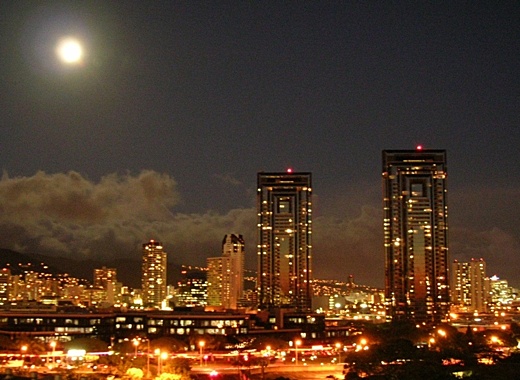By Ragnar Carlson on 24 February 2010 in Honolulu Weekly -
(http://honoluluweekly.com/feature/2010/02/curtis-call)

Image above: Honolulu lit up at night on fossil fuels. From (http://travel.webshots.com/photo/1526707581083146971QjlUpm).
Even if very few island residents have heard of it, government and industry insiders have known for decades that non-profit watchdog organization Life of the Land (http://www.lifeofthelandhawaii.org) is among the very most persistent and effective advocates for a better environmental and energy policy. As the group celebrates 40 years of wonky activism, we spoke with Executive Director Henry Curtis about energy issues at the 2010 legislative session.
Life of the Land seems to have become more focused on energy more than on development these days.
Yes, we do work on other things, but we’re more active on energy issues right now. Energy is really at a key moment in time. Climate change and peak oil both will fundamentally change the earth’s future. Hawaii has an opportunity, given that we have so many varieties of renewable energy available to us, to show the world how a transition from fossil fuels to renewable is possible.
Of course, the other side has enormous funds. If you look at Exxon Mobil, they make $100million per day in profits. They have a clear interest in the status quo. That money goes toward denying that climate change is real, and funding the naysayers. The coal companies, big agriculture, they’re all lining up to fight a move away from fossil fuels.
It’s often said that Hawaii is making real and serious progress on energy issues. Do you agree?
No. I think we’re making some progress, but leaving too much undone. If for example you look at all the energy bills moving through the Legislature, virtually none mention greenhouse gases. For example, there’s a bill moving along [HB 2421] that says we should expand tax credits for processing agricultural waste into ethanol and biodiesel. But it excludes local waste oil and includes imported palm oil, which is a huge contributor to deforestation and greenhouse gases.
Sounds like a handout.
It is. We’re not making the connections. HB 2421 is a tax on oil but not a tax on coal and not a tax on tropical biofuels. Of those three, oil is the least dangerous in terms of greenhouse gas emissions. So we’re taking the least dangerous and encouraging the use of the most dangerous, at least in terms of climate change.
What other energy matters are you focused on this year?
There’s also SB2224, which says that the PU comissioners have to file ethics reports with the state. They currently file them, but they’re not public. It would also say that the members of the Board of Land and Natural Resources should disclose their ethics forms. I think it has a chance [of passing] The BLNR is composed of mixed party affiliations. But the PUC is all Republican commissioners, so maybe it has a chance [in the Democratic-controlled Legislature. HB 2642 increases the funding to the Public Utilties Commission. It’s funded through a tax on HECO and other utilities. The rate was increased more than a decade ago, but the increase went to the state’s general fund. This redirects the funds from that tax directly to the PUC.
What are some non-energy bills youre looking at?
HB 2902, which is defunding ‘Olelo (the Hawaii public-access television network.) HB2737 is the bill that would allow the state to sell ceded lands. It says the state should be able to sell land whether ceded or not ceded.
HECO is proposing a full stop on alternative fuel production for Maui and the Big Island, calling it a capacity issue. Some in the industry point to Kauai, where HECO is not doing this, and suspect a profit motive on HECO’s part. What’s this about?
It’s not the level of renewable energy that matters in this case, it’s the amount of intermittent energy. The Big Island has a lot of wind, which is the cheapest and also the most intermittent of the renewable fuels. So having a lot of wind-energy on the grid impedes adding more renewables. Kauai has more biomass, so it’s not the same issue there.
So you believe HECO is acting in good faith on this.
I’m not sure I would say its in perfectly good faith. It is much more reasonable than it sounds to the average person, however. If you add solar using net metering feed-in tariffs, the way the law is written, the utility would have to accept it.
The problem with that is that the wind at South Point and Hawi are already in queu, but if you add more solar, and the utility has to add it, it ultimately curtails the wind energy [by taking up space in the system]. So a nonexistent new solar source would jump ahead of the existing wind sources. The solar industry loves that, but it hurts the wind industry, which is cheaper.
.
No comments :
Post a Comment